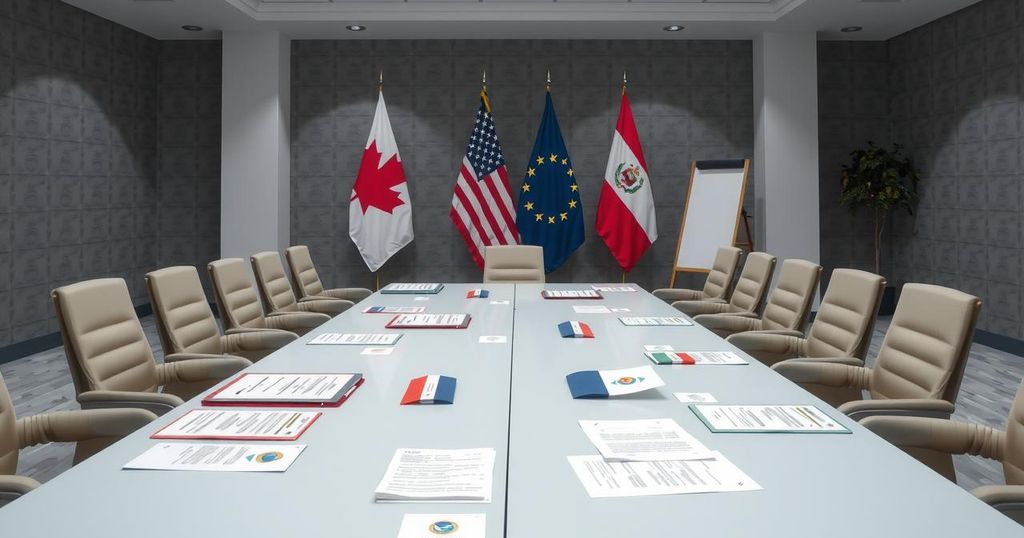Trump-Bukele Meeting: A Strategic Omission of Bitcoin Discussion?
On April 14th, Donald Trump and Salvadoran President Nayib Bukele met in the White House, focusing on immigration, security, and trade while omitting any discussion of Bitcoin. Trump’s proposals included deporting American criminals to El Salvador and aiding US automakers amidst a trade war. Despite Bukele’s Bitcoin adoption and Trump’s crypto initiatives, the absence of crypto dialogue suggests prioritisation of pressing geopolitical issues over cryptocurrency concerns. The meeting’s context also touches on El Salvador’s commitments to the IMF regarding its Bitcoin policy, creating a challenging balance for the Salvadoran government.
On April 14th, Donald Trump held a meeting with El Salvador’s President Nayib Bukele at the White House, primarily discussing immigration, security, and trade aspects between the two nations. Despite the significant opportunity to address cryptocurrency, particularly Bitcoin, it was notably omitted from the discussions, raising queries on whether this was an intentional strategy or an oversight due to timing constraints.
The agenda concentrated heavily on bilateral security and immigration, which remain critical issues for both nations. Trump proposed transferring American criminals into Salvadoran prisons, aimed at alleviating the overcrowded US penal system while simultaneously fostering closer cooperation between the two countries. This plan forms part of a $6 million agreement that encompasses deporting foreign criminals to El Salvador, along with suggestions to expand local prison facilities for deportees.
In addition, trade was a key topic, especially in light of the ongoing trade tensions with China. Trump suggested a temporary exemption for US automakers to facilitate their production relocation as they continue to navigate challenges arising from disrupted global supply chains. The discussions were rooted in immediate domestic policy and international trade concerns, which overshadowed the potential conversation around Bitcoin.
Despite Bitcoin’s prominent status in the agendas of both leaders, its absence at the meeting was striking. Bukele has championed Bitcoin since El Salvador’s groundbreaking move to adopt it as legal tender in 2021. Concurrently, Trump had expressed support by signing an executive order aimed at creating a strategic Bitcoin reserve for the US. However, their discussions did not include any mention of cryptocurrency, likely due to the pressing nature of security and diplomatic matters.
The choice to overlook Bitcoin during the meeting raises speculation about strategic intentions. With both leaders facing various international pressures, they may have decided to prioritise more immediate issues such as geopolitics and trade over the complex subject of cryptocurrency regulation and adoption, which still requires significant evolution in public understanding.
El Salvador also has commitments to honour with the International Monetary Fund (IMF), having signed a $1.4 billion agreement containing stipulations regarding its Bitcoin policy and a reduction in public sector cryptocurrency involvement. Although adjustments to Bitcoin laws have occurred to comply with IMF conditions, El Salvador continues to hold about 6,000 BTC, valued at approximately $520 million. Bukele’s government now finds itself balancing ambitions for cryptocurrency with the necessity of adhering to the IMF’s requirements for economic stability.
Conversely, Trump generally adopts a critical stance towards global institutions like the IMF, focusing on national strategies. His lack of engagement with Bitcoin could link back to his anti-institution narrative. The meeting, while lacking in discussions about cryptocurrency, nonetheless addressed immediate geopolitical challenges and concerns that overshadowed crypto, although its importance to both leaders remains evident. The evolving landscape of BTC will likely continue to influence US-El Salvador relations in light of economic and political developments in the near future.




Post Comment